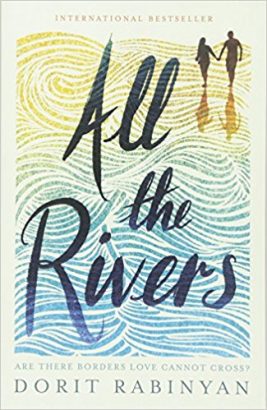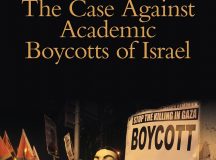It is hard to know how to talk about Dorit Rabinyan’s third novel, All the Rivers, an elegant, piercing chronicle of a love that begins in a New York cafe between Liat, an Israeli translation student, and Hilmi, a Palestinian artist, only to be challenged by the borders that exist between them. The style and sensibility can be subject to criticism, of course, but it is impossible to isolate the novel All the Rivers from its status as a lightning rod — the spark for a much larger debate about politics, culture, and education in Israel today.
In December 2015, the Ministry of Education removed All the Rivers from a list of books approved for the high school curriculum. Intimate relations between Jews and Arabs, the ministry affirmed, ‘are seen by large portions of society as a threat [to] separate identities’. Though few had read All the Rivers, least of all Education Minister Naftali Bennett — here the old Soviet cliché ‘ne chital, no skazhu,’ ‘I have not read, but I will say,’ comes to mind — the rights and wrongs of Rabinyan’s cross-cultural romance dominated Israeli public discourse.
The publication of All the Rivers in English brings this Israeli debate to a new audience, with the book’s reputation being wielded as a marketing tool. All the Rivers ‘became the centre of a political scandal in Israel when the Ministry of Education banned the book from high schools’ curriculum,’ the paperback’s opening page informs us. Rabinyan published an article in Time under the headline, ‘The Day Israel Banned My Book From Schools,’ in which she argues All the Rivers ‘touched a raw nerve in Israeli society’ that ‘condemned it to official rejection’. This use of the word banned is more than a bit misleading by any traditional sense of the verb. It is surely more than enough to say that All the Rivers was excluded from the curriculum in a highly politicised fashion on the basis of its subject matter.
Indeed, its politicisation is so intrinsic to the novel at this point that All the Rivers must be considered and deconstructed both as script and then symbol. Its literary merit on the one hand must be weighed against its value for what it has to teach and impart on the other.
These two measures meet in Rabinyan’s unfortunate tendency to put the subtext of her transnational relationship in the foreground. At times she eschews the principle: Show, don’t tell. ‘While I stood outside the women’s lavatory waiting for someone to emerge, I wondered whether Hilmi, in the men’s room on the other side of the wall, was also reading the word in the little door lock — Occupied — and thinking about the occupation,’ she wonders. In another clunky passage, Rabinyan writes:
When I looked up from my bag I saw his eyes light up on hearing a metallic clang, until he realised it was my own keys jangling. I was struck again by a dim echo of guilt and by the inescapable symbolism: the loss of his keys and the jangling presence of my own as a simplistic metaphor for our miserable situation back home.
In that sense, All the Rivers reaffirms the old idea that the Israeli-Palestinian conflict rarely makes for good fiction, at least when it is presented rather than suggested or explored. Rabinyan has Liat and Hilmi engage in rather rote arguments about politics, using words and phrases with which by now we are entirely familiar, as they veer towards becoming stock characters. Hilmi is the misty-eyed dreamer, supporter of binationalism, informed by borrowed memories; Liat becomes the proto-typical centrist Israeli, critic at home but guardian of Zionism abroad. There is nothing here that breaks through to something new.
The novel’s politics are thus quite plain, which makes the reaction to All the Rivers all the odder. Bennett claimed the book described Israeli soldiers as war criminals, a portrayal he deemed ‘sadistic’ as he read out-of-context passages from the novel on Channel 2. (Presumably, Bennett was reading All the Rivers with the freshness of surprise.) Bennett said he wouldn’t ‘force’ Israeli children to read a book in which ‘soldiers are equated with Hamas terrorists and which describes an affair between a Palestinian security detainee and an Israeli woman,’ Ha’aretz reported. Suffice it to say, this tendentious and hyperbolic characterisation bears little if any relation to the actual novel.
Had Bennett read All the Rivers, he would have discovered how Rabinyan, for example, deftly captures the psychological burden that comes with being in a stigmatised relationship. Love for a Palestinian involves Liat engaging in a constant game of bluff, keeping something back, retreating into daydream about the things she cannot say:
I don’t tell anyone how fast he gets turned on, catching fire like a field of thistles, eager and yearning all the time, lusting after me. And about how our nights are like an apple that grows new flesh even as we bite into it. About our blissful delight, at once selfish and giving, starving and feeding and starving again … how sometimes in those moments I feel that I am almost becoming him, so close to him, and infused with him that I can practically feel what it is to be him.
In public with Hilmi, she shrinks into herself if she spots someone she knows and she is ‘so focused on my own anxiety and need to hide, on the danger and the escape,’ she fails to consider how Hilmi ‘was interpreting things, or what he was thinking and feeling.’ After one tense encounter, Hilmi spits at Liat, ‘What am I to you? … Your lover? I’m your secret Arab lover?’ She agrees. ‘Arab, and secret … and temporary.’ (Temporary, because by definition what can exist in New York cannot exist in Tel Aviv — another point for Bennett to consider.)
Once the action returns to Israel for its conclusion, Rabinyan ends up taking the easy way out. But the New York scenes showcase the brilliant aspects of her prose style (superbly captured in English by Jessica Cohen) in passages about the thing that, in the end, is most important to the novel: love. When Liat and Hilmi are together in New York, ‘the entire world seems to be threaded on a single string, pulsing and brimming with life’. There is, too, a ‘secret feeling of victory’ in their love, ‘two anonymous individuals embracing among the endless blinking lights and the huge commotion of the city’. That which is forbidden is realised, if only for a moment. Love becomes another victim of this conflict without end.





































Comments are closed.